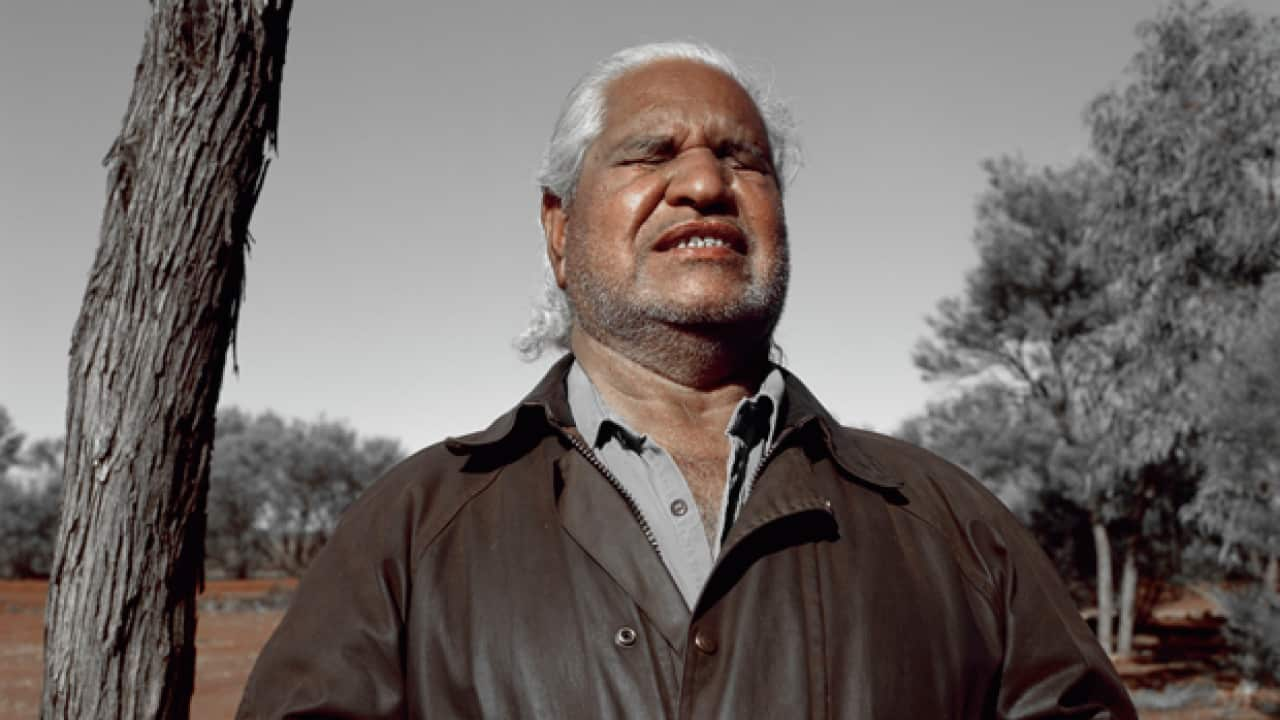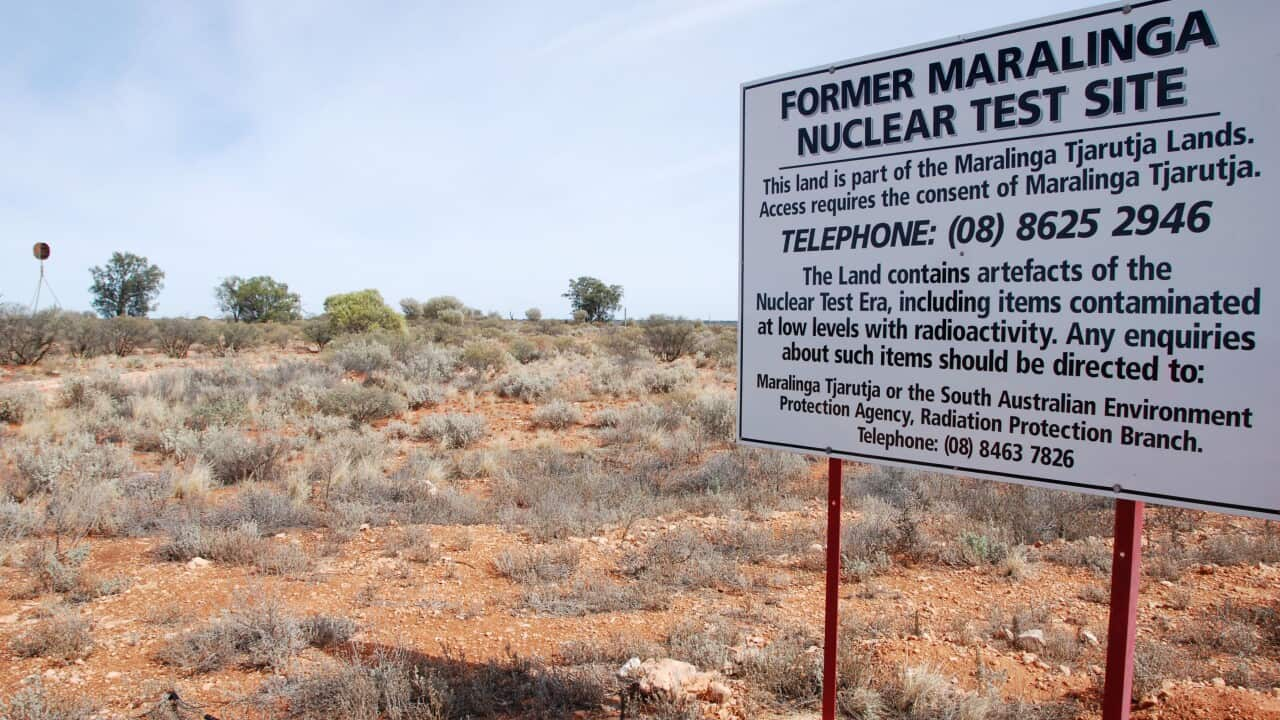Anyone who goes through the historic photos of the western desert mob standing up for their land rights in the 70s and 80s will soon recognise the ubiquitous face of Yami Lester, or ‘Tjamu’ (Grandfather) Lester.
Yami Lester OAM was born in the early 1940s at Walkinytjanu Creek, an outstation on Granite Downs Station in the far north of South Australia. He lived a life of fruitful activism and achievement, despite the hardships he endured.
Tjamu Lester was blinded when he was about ten years old, as a result of the ‘black mist’ that descended on the Anangu Pitjantjatjara Yankunytjatjara Lands (APY Lands) after the British nuclear tests at Maralinga, South Australia, in the 1950s. He worked as a stockman before losing his sight. But his disability didn’t deter his drive to stand up against the powers that attempted to erode the desert mob’s entitlements over their land.
RELATED CONTENT

Maralinga nuclear tests 60 years on: what do we know now?
Tjamu Lester was instrumental in various negotiations over Aboriginal land claims in South Australia and the Northern Territory.
For decades, he served as an interpreter and cultural adviser between the Anangu people and state, territory and federal governments on behalf of the Pitjantjatjara Council, during the arduous legal battles to win inalienable freehold titles for Traditional Owners.
Tjamu Lester’s son, Leroy Lester, recalled during the 30th anniversary of the hand-back of Uluru-Kata Tjuta National Park, his father was heavily engrossed not only in the legal proceedings but also in the decades of negotiations leading to the historical handover decision of 1985, which became a symbolic highlight for Aboriginal land rights.
“He was involved in organising a lot of Anangu in the area and mostly doing a lot of interpreting too, between Anangu and the lawyers,” Leroy remembers.
NT Chief Minister Michael Gunner remembered Mr Lester as “a key Aboriginal leader who embraced the challenge of bridging two worlds".
"He never let his blindness hold him back, he was sharp as a tack in negotiating at the highest levels of business and government,” Mr Gunner said on Saturday.
"His life was a life of great hardship and challenge, met with great courage and foresight, and he achieved great change."
Throughout his life, Tjamu Lester also campaigned tirelessly at a local, national and international level for the restoration of Maralinga, following the atomic bomb testing.
His case was pivotal in the , as it demonstrated the harm caused by the black mist. The inquest resulted in group compensation for the Maralinga Tjarutja people and clean-up operations in the area.
In May, in light of the government’s announcement that it would finally provide a gold card to cover the health care costs of the surviving participants of the British Nuclear Test program, Tjamu Lester told NITV News the support came "60 years too late".
“Most of our people have passed away. They were young ones then, now they’re older ones now, a few of them still living now today.”
He said he believed the government was only doing it to improve their image.
“I think they’re doing it just to look good, and they’re not looking good… At all.
“Our people were sick, very sick. They were on the lands and they needed help. They’re doing it too late. They didn’t [do] compensation before, early, they didn’t do it.”
Tjamu Lester also inspired his daughters Rose and Karina to carry on the fight for compensation for the destruction and contamination of Aboriginal lands and the dispossession of Anangu. Both Karina and Rose are continuing their father’s legacy by staunchly advocating against South Australia’s recent proposals for nuclear waste dumps.
South Australia's Aboriginal Affairs Minister, Kyam Maher, paid tribute to Mr Lester by recognising how he has inspired so many, leaving behind a strong legacy.
"My thoughts are with his family, who carry on his work of activism, standing up for the rights and views of Anangu and preserving culture and language," he said in a statement on Saturday.
Labor Senator, Marlandirri Mcarthy, has also sent her condolences to the Lester family and acknowledged Tjamu Lester’s legacy in a statement.
“Despite his own personal challenges, he inspired so many Australians to never give up fighting for justice,” Senator McCarthy said.
The sentiment was echoed by NT Shadow Assistant Minister and Member for Lingiari, Warren Snowdon: "Mr Lester was a friend of mine for more than 40 years, and I had the utmost respect and admiration for him".
In a media statement, the Lester family expressed both sadness and gratitude.
“His warmth, kindness, generosity and resolve inspired so many Aboriginal and non-Aboriginal people and as Tjamu (grandfather) and Katja (Great grandfather), he will be forever remembered by his loved ones, his extended family, community and by so many.
“Yami leaves an incredible legacy of better global understanding of the devastation of nuclear bombs and for the ongoing battle for recognition of the consequence of them on the rights and interests of Anangu.”
Tjamu Lester may be farewelled at a state funeral if his family accepts the offer from the Northern Territory government.
The South Australian government is also consulting with his family on a memorial to recognise his contribution to the state.
With AAP













